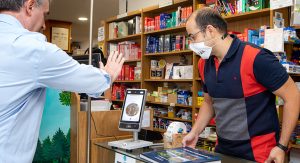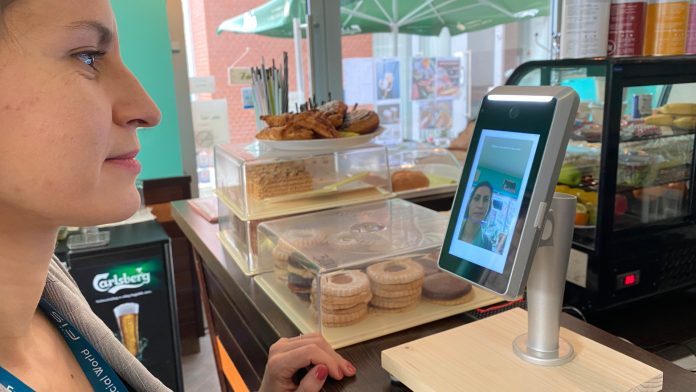A new system developed by EIT Digital start-up PeasyPay is allowing people to pay by just showing their faces and taking a picture of the palm of their hands.
PeasyPay’s new solution for biometric payments means that European customers will be able to enter a shop, choose what they want and pay without the need for a wallet, smartphone, or credit card. Instead, the newly developed system lets people pay by just showing their faces and taking a picture of the palm of their hands, making the whole process faster and more convenient.
Launched by EIT Digital within its Innovation Factory, where a number of EIT Digital Partners come together to launch a deep tech venture into the market, PeasyPay was first rolled out in Budapest and is currently being piloted in Guadalajara, Spain. Slovenia and the UK will follow.
Pay with a smile
The project’s codename is ‘Pay with a smile’, and it is within the Digital Finance portfolio of the EIT Digital Innovation Factory. The partnership behind the initiative includes two Spanish partners, Ci3 and Liberbank, two Hungarian ones, E-Group and OTP Bank, and Slovenia’s AV Living Lab.
PeasyPay’s product leader Csaba Körmöczi explained: “The system is composed of three elements: a smartphone app for the customer (used only during registration), a smartphone app for the merchants, and the payment terminal.”
When a customer takes a selfie and a picture of their palm with their mobile phone’s camera, digital profiles of them are created through the app (which is available on both Android and iOS). They are then instructed to register their bank card details on an integrated, secure payment gateway.
A special point-of-sale (POS) machine, equipped with cameras and facial recognition software that scans customers’ faces and palms and compares them to the biometric template created in advance, is used to implement the actual in-store payment.
The combination of face and palm scanning solves the issue of mismatching a person, as facial recognition systems’ accuracy degree can vary significantly depending on the person, software, and situation. When the system is used and a match is made, the payment is authorised, and the amount charged to the credit card registered in the payment gateway of the corresponding PeasyPay account.
Of course, PeasyPay’s solution is fully compliant with all European regulations, especially GDPR and national data protection laws, particularly those concerning the non-authorisation of biometric data processing for uniquely identifying purposes unless the data subject has given explicit consent for a specified purpose.
While many other technologies for payment solutions are fully dependent on a proprietary infrastructure and ecosystem, PeasyPay’s system is unique in that it is based on an open system, meaning that any bank and any merchant can join.

Roll out
The PeasyPay solution first became operational in Budapest in December 2019 in a coffee shop frequented by the tech-savvy employees of the city’s second district, although there was a short break in its usage in the spring due to the COVID-19 pandemic. Now, OTP Bank and e-Group are joining forces to spread PeasyPay further in the Hungarian capital: a marketing campaign will engage members of the local hospitality industry and retail sector.
In Guadalajara, Spain, a pilot use case of PeasyPay, targeting the city’s food, retail, and hospitality industry, is ongoing. This began in July, with four small shops located in the city centre trialling the technology., It is now being extended to other businesses, with a total of, 25 proximity shops (bakeries, butcher’s shops, grocery stores, cafés, bookstores, print shops, and herbal shops) participating in the Spanish pilot. The plan is to make the PeasyPay solution available in department stores, too.
More pilots are planned elsewhere. In the UK, the system is being set up to allow taxi drivers to seamlessly pay the fee to enter Glasgow Airport’s parking area, while in Slovenia, the pilot will take place in a restaurant.
During the pilot phase, only customers based in Hungary, Spain, Slovenia, and the UK will be able to download PeasyPay from their local app store. By the end of the year, however, the app will be rolled out globally.
About EIT Digital
EIT Digital is a leading European digital innovation and entrepreneurial education organisation supporting the creation of a strong digital Europe.
EIT Digital is focused on building and scaling ventures and on breeding and up-skilling talents to equip them with both digital and entrepreneurial skills. It does this by mobilising a pan-European ecosystem of over 300 top European corporations, SMEs, start-ups, universities, and research institutes.
As a Knowledge and Innovation Community of the European Institute of Innovation and Technology, EIT Digital is focused on entrepreneurship and is at the forefront of integrating education, research, and business by bringing together students, researchers, engineers, business developers, and entrepreneurs. This is done in its pan-European network of Co-Location Centres in Berlin, Budapest, Eindhoven, Helsinki, London, Madrid, Paris, Stockholm, and Trento. It also has a hub in Silicon Valley.
Csaba Körmöczi
Project lead
PeasyPay
info@peasypay.eu
www.peasypay.eu
www.eitdigital.eu
Please note, this article will also appear in the fourth edition of our new quarterly publication.









